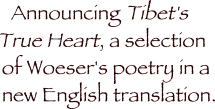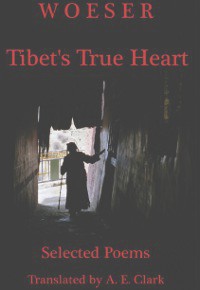Is power all you need to make your views prevail?
Fifty years after 1959, the Chinese government seems to have awakened with a jolt and has rushed to declare a Serf Emancipation Day. Suddenly the whole country, from the top down, is vigorously banging the drum as high-level leaders set the tone with repeated appearances. Every hour on TV there’s a program contrasting the new Tibet with the old; sitting in a Beijing taxi, you can hear several radio stations quacking on about the earth-shaking transformation of Tibet; inside the country, there are exhibitions, while overseas they're making the rounds with the same message, and the internet has been saturated with it. Even such a high-quality periodical as Sanlian Life Weekly has put out a special issue on “The fiftieth anniversary of Tibet’s democratic revolution.”
The foreign Tibet scholar Elliot Sperling has commented: “There is nothing subtle about all this; China is quite determined to dominate the Tibetan historical view, whether or not coercion or even force [of arms] is necessary.” In the course of this loud and forceful rewriting of history, to which considerable human and material resources have been devoted, new phrases are often mingled with the old clichés. One of these new phrases — it’s become a buzzword — is ‘misreading.’ The term has come in handy for all the mouthpieces promoting [China's] soft power. Du Yongbin, of Beijing’s Tibetan Studies Center, recently wrote an article, “Western society has five big misreadings about Tibet,” on which the official media have lavished praise.
One of the ‘misreadings’ he cites is “the misreading of Tibet’s development and modernization.” This seems a politically correct thesis in which a concept is very likely to have been redefined in order to set up a straw man. Du claims, “Every ethnic group in the world (and naturally that includes the Tibetans) has a right to participate in the achievements that have come through social development, technological progress, and modernization” but “some Westerners don’t want to see Tibetan culture develop and be adapted to modernity.” This sounds well-intentioned and plausible. It’s certainly true that we should not reject modernization; in particular, those whose lives have already undergone modernization have no grounds for preventing others from pursuing it. But Du’s mechanical and materialistic view of ‘modernization’ provides the kind of rationalization characteristic of someone with ulterior motives. One Tibetan old-timer got right to the point when he submitted a petition to the authorities: “Tibet needs to become modern, but becoming modern does not equal becoming Han.”
The Overseas Times in America also has an article criticizing Westerners’ ‘misreadings’ of Tibet. (This paper is an embodiment in America of China’s People’s Daily.) News-media mouthpieces of this type don’t need to dress up their advocacy with scholarly references: they baldly announce their ambitions. “How can China effectively change Westerners’ misreadings of Tibet? There’s only one way: we must become mighty enough to have discourse power in the mainstream of international society and begin to establish our ability to get our message across, becoming a player, even to the point of setting the rules of the game for the mainstream of international society: that will be the day when the West’s ‘misreading’ of Tibet comes to an end.”
As overweening as this may sound, they have the resources to back it up. It was learned recently that in pursuit of ‘discourse power’ the Chinese government has allotted to each of three mouthpieces (namely, Xinhua, People's Daily, and CCTV) the substantial sum of 15 billion RMB, ordering them to go forth and expand overseas with high-powered media work and realize the lovely dream that was articulated by Overseas Times. But wealth is not the same as the resonance of truth. A senior figure in the foreign press corps told me that not long ago an official from Xinhua privately approached him for advice, asking how to achieve discourse power in the West. He gave a brilliant answer: “In a word, positioning.” Then he explained, “You people are positioned as mouthpieces, so you can’t think about whether the news you report is true or not; and so you are incapable of establishing any power of discourse. We, on the other hand, are positioned to make money. In order to make money we’ve got to provide truthful reporting, and that’s a necessary condition for establishing authority in discourse.” When he heard this, the Xinhua official was very uncomfortable.
So there’s no need to worry about what will come of that ‘discourse power’ which the Chinese government is resolved to obtain through gigantic effort and expense. As Elliot Sperling says, “Such a ham-handed propaganda campaign ... is also unlikely to win over large foreign audiences beyond those who already are, or would like to be, convinced.” The world changes as it turns, and popular opinion will render its own verdict. Once the Soviet Union was even mightier than China, and innumerable people misjudged it; but today it is openly acknowledged to have been akin to fascism, that is, for the human race it was “the crime of the twentieth century.”
Woeser wrote this article for the Tibetan−language service of Radio Free Asia.
Translator’s Notes
I have sometimes used phrases such as “To make one’s views prevail,” “to control the discussion,” “to establish authority in discourse” in order to elucidate the term huayu quan, ‘discourse power.’ The expression is akin to the military term for ‘air superiority’ (zhikong quan) and suggests a belief that the domain of human discourse is an arena to be dominated by the sufficient application of power. Woeser is, of course, rejecting that belief.
The article by Elliot Sperling which Woeser quotes appeared in the April 2009 issue of Far Eastern Economic Review under the title, “China digs in its heels in Tibet.” I have quoted from his original English, noting that in one place where he writes “force” she uses the Chinese word wuli, ‘force of arms’ (military force).
The Overseas Times (Qiao Bao) is an online Chinese-language newspaper with a readership of overseas Chinese.
15 billion RMB: for a total of 45 billion RMB, approximately USD 7 billion.


